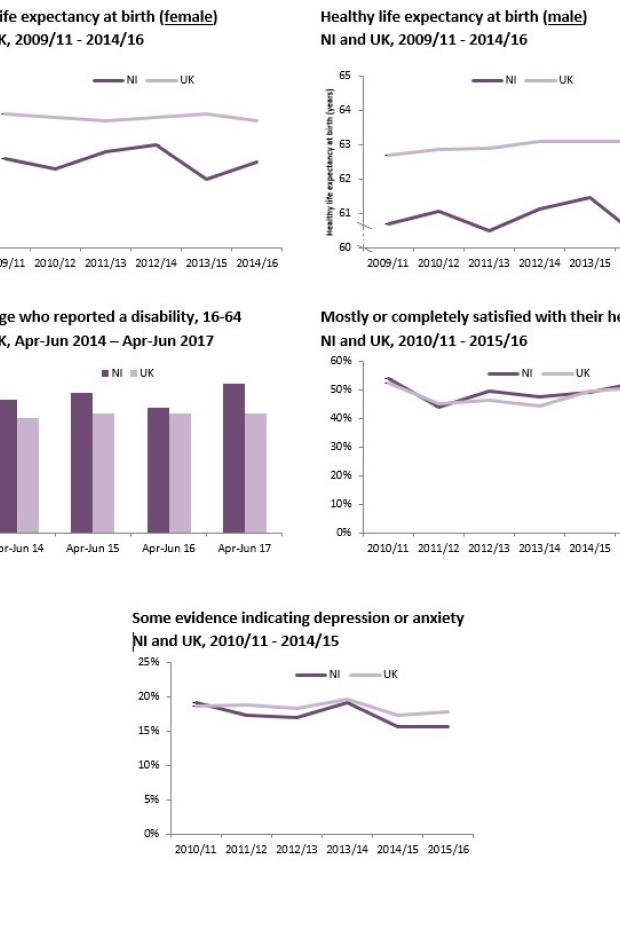The World Health Organisation defines health as ‘a state of complete physical, mental and social wellbeing and not merely the absence of disease or infirmity’.
The 4 measures in the Health domain are:
- Healthy life expectancy at birth (male/female)
- Percentage who reported a disability
- Mostly or completely satisfied with their health
- Some evidence indicating depression or anxiety

- Healthy Life Expectancy (HLE) estimates years of lifetime spent in “Very good” or “Good” health based on how individuals perceive their general health. Data for this indicator are produced by ONS. The latest data (2014-2016) indicates that HLE at birth is 60.3 years for males and 62.5 years for females in Northern Ireland. This is lower than HLE at birth in the UK overall which is 63.1 years for males and 63.7 years for females.
- Healthy Life Expectancy data are also produced by NISRA statisticians in the Department of Health. These data source general health levels from the Health Survey for Northern Ireland and are therefore based on a larger sample than those used by the ONS National Wellbeing Programme. Data for the Healthy Life Expectancy indicators included in the NICS Outcomes Delivery Plan framework are sourced from Department of Health data.
- Data on the percentage reporting a disability is sourced from the Labour Force Survey and uses the Government Statistical Service harmonised definition of disability. The definition covers people who report a physical or mental health condition or illnesses lasting or expected to last 12 months or more where this reduces their ability to carry out day-to-day activities. Overall, 21.7% of respondents aged 16-64 in Northern Ireland (Apr-Jun 2017) reported a long-term illness and a disability. In the UK overall the figure was 17.4%.
- The two remaining measures in this domain are based on data from the Understanding Society Longitudinal Study. In 2015/16, 52.8% of respondents in Northern Ireland indicated that they were mostly or completely satisfied with their health. This is comparable with the UK overall (51.0%).
- The General Health Questionnaire (GHQ12), consists of 12 items and a score of 4 or more is regarded as an indication of mental ill health. The proportion of respondents in NI showing evidence of some mental ill health was 15.6% in 2015/16. In the UK overall, the proportion was 17.8%.
- GHQ12 data are also used to inform a NICS Outcomes Delivery Plan indicator, although these will be sourced from the Health Survey for Northern Ireland.
Do you want to know more? – Office for National Statistics Wellbeing
10 National Wellbeing Domains
Personal wellbeing Our relationships Health What we do
Where we live Personal finance The economy